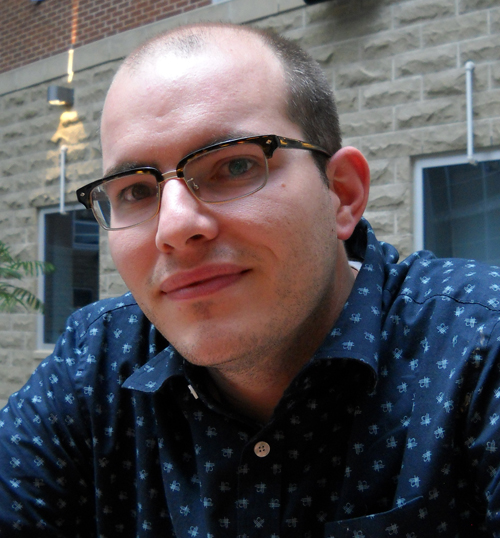
One main hurdle keeping Patrick Moynihan from completing his graduate degrees had nothing to do with the microbiology lab.
Yes, his studies of disease-causing bacteria posed technical challenges. “Bacteria live in a complex world,” he says.
Those issues were compounded by a chronic, painful ailment that struck during his master’s studies. Undiagnosed for months, the illness left him barely able to get out of bed some days, let alone make it to his U of G lab.
After doctors figured out his problem, Moynihan completed a master’s degree; he will finish his doctorate this fall.
Along the way, he discovered a potential antibiotic target to treat ever-more virulent infections such as meningitis and gonorrhea. Along with his supervisor, Prof. Anthony Clarke, Molecular and Cellular Biology, he has now published study results in the journal Analytical Biochemistry.
They have figured out the workings of an enzyme believed to allow growth and virulence of important pathogens, including methicillin-resistant Staphylococcus aureus.
Their research offers hope of developing new drugs, says Moynihan. These and other bugs “are developing resistance to antimicrobials at an alarming rate.”
His work won a Terry Beveridge poster award from the Canadian Society for Microbiologists this summer. The award is named for the late Prof. Terry Beveridge, a long-time faculty member at Guelph and a former colleague of Clarke’s.
The enzyme strengthens the microbial cell and helps it thwart the human body’s defences, says Moynihan.
For a burn wound, say, the body pumps up substances to fight off infection. But bugs often find a way around those defences, including developing resistance to medicines.
In turn, an inhibitor drug might prevent infection.
“It’s true of a lot of things in antibiotic resistance: it’s all spy versus spy,” says Moynihan.
The project involved lots of screening of substances and purifying of proteins in the lab. Besides a few wrong turns at the lab bench, he encountered an unexpected hurdle a few months after starting his master’s degree in 2005.
He had noticed periodic back pain and fatigue at the end of his undergrad degree in molecular biology and genetics in 2005. He realized one night things were more serious when it took him a teeth-gritting hour to shimmy across the bed to the phone.
At the hospital, they ruled out multiple sclerosis, but couldn’t tell him what he had. Maybe he’d suffered an injury from playing ultimate Frisbee or intramural soccer? A sports doctor booked an MRI that turned up nothing.
At last, a blood test cleared it up: Moynihan had ankylosing spondylitis, a form of chronic, inflammatory arthritis in the spine. No cure exists, but doctors can treat the pain with medication.
It had taken almost two years to diagnose. More maddening, other family members – two uncles, an aunt and Patrick’s dad, even Patrick’s brother – also had the genetic disease. But doctors had pursued other possible diagnoses.
For almost a year, he says, he was nearly incapacitated. Half a year after a rheumatologist prescribed medications, Moynihan was functioning again.
He started his PhD in 2008. Pain still flares up in his legs, back and feet, but he’s able to manage it with medications.
Moynihan was involved in World Youth Day held in Toronto in 2002. The next year he met then Pope John Paul II in the papal apartment in Rome.
By then, John Paul was suffering from his own physical ailments. Moynihan drew inspiration from that visit. “When I’m in a lot of pain, it’s very easy to go down the road of ‘Why me?’ It’s easy to get self-pitying. I know a lot of people deal with things much worse.”
He says he also drew strength from his supervisor. “All through my master’s, I was not sure how good a scientist I was.”
After he confessed his uncertainty about a PhD, he says Clarke told him: “‘No question you have the ability.’ It felt good to have someone say that.”
Moynihan had thought earlier about becoming a doctor. Today it’s research that attracts him.
In January, he will begin studying tuberculosis under a fellowship at the University of Birmingham. Researchers there belong to the Canada/U.K. Partnership on Antibiotic Resistance, co-led by Clarke.
Moynihan will be accompanied by his wife, Emilie, and two preschoolers – and a newborn due in November.